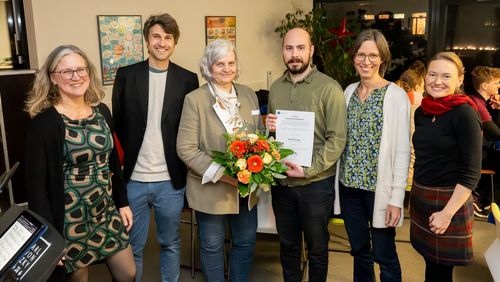How do the different healthcare systems in Germany and the Netherlands affect the healthcare of individual citizens? In a new project, health services researchers from Oldenburg and Groningen are now addressing this question using the Ems-Dollart border region as a living lab.
The differences between the healthcare systems of Germany and the Netherlands are the focus of a new joint research project of the Universities of Oldenburg and Groningen. An interdisciplinary consortium headed by Oldenburg health services researchers Prof. Dr. Falk Hoffmann and Prof. Dr. Lena Ansmann will investigate how structural differences in these two healthcare systems affect healthcare for patients in the Ems Dollart Region. The project "Comparison of healthcare structures, processes and outcomes in the German and Dutch cross-border region (CHARE-GD I)" will receive around one million euros in funding from the Ministry for Science and Culture of Lower Saxony (MWK) over the next three years.
The project is based at the Cross-Border Institute of Healthcare Systems and Prevention (CBI), a joint initiative of the University of Oldenburg's School of Medicine and Health Sciences, the University of Groningen and the University Medical Center Groningen (UMCG). "Our collaboration at the Cross-Border Institute allows us to jointly investigate health-related issues and at the same time learn from each other," said Prof. Dr Hans Gerd Nothwang, Dean of medical School at the University of Oldenburg.
Closing the research gap
"The healthcare systems in Germany and the Netherlands are among the best in Europe", said co-speaker of the consortium Falk Hoffmann. However, although the two systems face similar challenges, for example in terms of demographic trends, there are major differences in the way they are organised. For example, the number of hospitals and hospital beds in Germany is higher than in the Netherlands. And whereas in Germany about half of all specialists are in private practice, in the Netherlands almost all specialists are based at hospitals. "Yet so far there has been hardly any systematic research into how these structural differences affect healthcare and ultimately treatment outcomes. We want to try to close this gap with our current project," Hoffmann explained.
Dutch and German health services researchers, public health experts, biomedical scientists, social scientists, economists and information technologists will all work together in the project. Thanks to this interdisciplinary approach, the consortium will be able to systematically examine the respective particularities of the two healthcare systems at different levels. "Ultimately we also aim to lay the scientific foundations for cross-border healthcare," said Hoffmann.
The Ems-Dollart region as living lab
The team of researchers will use the rural border region between the north-east of the Netherlands and the north-west of Germany as a living laboratory. One of the key objectives of the project is to build up a data infrastructure that identifies and brings together publicly accessible information about the organisation of healthcare systems in the Ems Dollart Region, which spans both sides of the border. The data is intended to provide a systematic basis for future scientific research and also be made available to decision-makers and patients.
In addition, the researchers will study healthcare services in three different sectors: in the area of primary healthcare they plan to compare the prevalence of antibiotic-resistant bacteria in patients with urinary tract infections. Another sub-project will deal with differences in clinical rehabilitation following hip surgery. And a third sub-project aims to compare healthcare in nursing homes in the two countries. "Our project is also intended to serve as a key starting point for meeting the requirements of the European directive - namely implementing the coordination of cross-border healthcare," said Prof. Dr. Alex Friedrich, Professor and Chair of Medical Microbiology and Infection Prevention at the University of Groningen.
A European healthcare system
The Cross-Border Institute of Healthcare Systems and Prevention (CBI) was founded by Prof. Dr. Lena Ansmann and Prof. Dr. Axel Hamprecht, director of the University of Oldenburg's Institute for Medical Microbiology and Virology, together with Groningen Professor of Public Health Jochen Mierau and Prof. Dr. Alex Friedrich with the goal of laying the scientific foundations for this form of cross-border cooperation.
"Healthcare as conceived by Europe and for Europe should not stop at national borders," Ansmann stressed. An important basis for this is to draw conclusions from the comparison of the Dutch and German healthcare systems and then make recommendations for practice, she added. The goal is also to find evidence-based solutions for common problems in healthcare, as the CBI researchers explain in a recently published position paper. According to the signatories of the paper, including the Board of Directors of the Ems Dollart Region, to achieve this goal the participation and commitment of various stakeholders is needed. "We therefore invite health insurance companies in the region, healthcare policy makers, and health authorities in the provinces of Groningen, Drenthe, Friesland and in the Weser-Ems region in Germany to join in and support the efforts of the CBI," said Ansmann.






